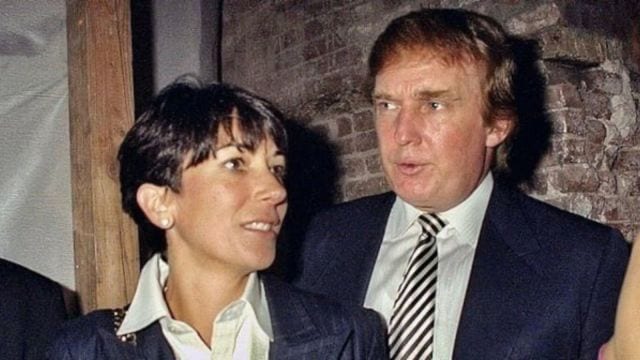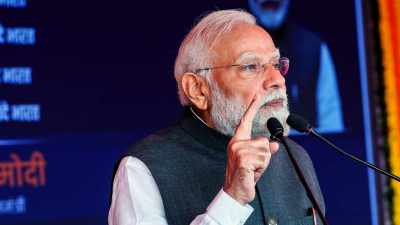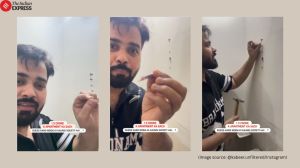Stay updated with the latest - Click here to follow us on Instagram
Who is Ghislaine Maxwell, Jeffrey Epstein’s former girlfriend who is in federal spotlight again?
Maxwell shared a long-standing relationship with Jeffrey Epstein, who was charged in 2019 with sex trafficking and abusing underage girls. Though they dated briefly in the 1990s, they reportedly stayed close for years.
 Despite no formal deal for sentence reduction or clemency, Maxwell is hoping her cooperation might lead to relief. (Photo: @AdameMedia /X)
Despite no formal deal for sentence reduction or clemency, Maxwell is hoping her cooperation might lead to relief. (Photo: @AdameMedia /X)Ghislaine Maxwell, at the centre of national attention again despite being sentenced to 20 years in jail, represents much more than the image of a fallen socialite. Once a fixture of elite parties in New York and London, she was convicted three years ago for aiding Jeffrey Epstein’s sexual abuse of underage girls.
This week, Todd Blanche, the US Deputy Attorney General, met with her for several hours over two days. What emerged from those conversations is unknown, but Blanche later wrote on social media that the Justice Department “will share additional information about what we learned at the appropriate time.”
His visit comes amid renewed political pressure over the federal government’s handling of the Epstein case — a pressure intensified by President Donald Trump’s refusal to answer questions about the disgraced financier. Maxwell’s attorney, David Oscar Markus, said there were no discussions with the government about a presidential pardon, but added: “The President this morning said he had the power to do so. We hope he exercises that power in the right and just way.”
Coming from power and privilege
Maxwell, 63, was born into British privilege as the youngest daughter of Robert Maxwell, the Czech-born media tycoon whose empire included The Daily Mirror and publisher Macmillan. After her father died in 1991 under mysterious circumstances, falling from his yacht, Ghislaine relocated to New York City.
In the US, Maxwell entered elite social circles and was seen at major public events. She attended Chelsea Clinton’s wedding and was photographed in 2000 with Donald Trump, Melania Trump, and Epstein. According to CNN, she was also seen at the Clinton Global Initiative summit, though Chelsea Clinton’s spokesperson, Bari Lurie, said Maxwell was invited because she was dating a friend of Clinton’s.
The Epstein connection
She was photographed at a memorial service soon after, seated beside a man who would come to define her public legacy: Jeffrey Epstein.
Their relationship was at times romantic, though she later worked for him in various roles, managing his household staff and personal affairs. As investigators would later allege, her proximity to Epstein extended far beyond domestic management.
According to federal prosecutors, between 1994 and 2004, Maxwell helped Epstein groom and traffic girls as young as 14. Court documents and trial testimony portrayed her as a recruiter, someone who could set victims at ease by offering the reassurance of an approving adult woman.
The abuse, prosecutors said, occurred in a well-oiled system: Maxwell would invite girls on shopping trips, pay for travel, and promise educational assistance. She would undress in front of the girls, discuss sexual topics, and normalize the idea of giving Epstein massages that turned sexual. She sometimes participated. In exchange, the victims were paid in cash and, in some cases, pressured to bring in more girls.
Maxwell’s attorneys claimed that her accusers’ memories had been shaped and distorted by lawyers pursuing civil suits. But in December 2021, a jury convicted her on multiple federal charges, including sex trafficking and conspiracy. She was sentenced in 2022.
Maxwell has long insisted she had no knowledge that Epstein, who died by suicide in a Manhattan jail in 2019 while awaiting trial, was sexually abusing minors.
Virginia Giuffre, one of the most vocal Epstein survivors, said she was recruited by Maxwell as a teenager while working at Trump’s Mar-a-Lago resort. Giuffre later sued Maxwell for defamation after Maxwell dismissed her claims as “obvious lies.” The case was settled in Giuffre’s favor.
Giuffre also filed a lawsuit against Prince Andrew of Britain, alleging he had sexually abused her at Epstein’s homes. He denied the charges, but settled the suit in 2022.
Maxwell is currently appealing her conviction to the US Supreme Court, arguing that a 2008 non-prosecution deal Epstein struck with Florida prosecutors should have shielded her from federal charges. The Justice Department has urged the Court to reject that claim.
Why is she in news now?
Despite her incarceration, Maxwell remains a person of interest to federal investigators and to members of Congress. The House Oversight Committee voted this week to subpoena her for a deposition.
Blanche, in a statement posted to social media, left open the possibility that Maxwell could assist in identifying others who may have committed crimes against Epstein’s victims. “If Ghislaine Maxwell has information about anyone who has committed crimes against victims,” he said, “the FBI and the DOJ will hear what she has to say.”
Her attorney, Markus, said only that Maxwell would “always testify truthfully.”
Maxwell did not take the stand during her own trial, but she has given two long depositions in previous civil cases. In them, she dismissed the idea that Epstein’s homes were filled with minors. “As far as I’m concerned, everyone who came to his house was an adult professional person,” she said at the time.
The testimony of four women proved damning, and Maxwell was ultimately convicted on five of six charges.
(With input from New York Times, The Washington Post, CNN, AP)





- 01
- 02
- 03
- 04
- 05


























